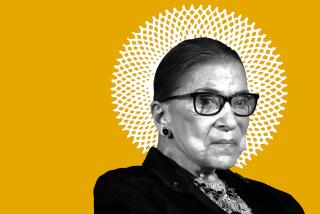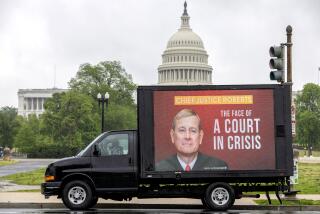Ginsburg’s Tie to Cable Firm Is Questioned
- Share via
WASHINGTON — Supreme Court nominee Douglas H. Ginsburg had almost $140,000 invested in a cable television corporation when he “personally handled” a Justice Department effort to have the high court extend First Amendment protection to cable operators.
An Administration source close to Ginsburg said Sunday that Ginsburg apparently did not raise the possibility of staying out of the case with Justice Department superiors or with agency ethics officers. He said Ginsburg discussed the situation with a subordinate.
The Supreme Court, on June 2, 1986, adopted Ginsburg’s arguments in a decision that will reduce government regulation of cable operators.
‘Economic Consequences’
“It is a First Amendment rights case that had economic consequences to it,” said a former federal ethics official familiar with the cable case but not with Ginsburg’s role in it. “If I’m holding cable stock, that is a good thing for me.”
Ginsburg, nominated by President Reagan to succeed retired Justice Lewis F. Powell Jr. on the court, apparently did not violate criminal conflict-of-interest laws because the company in which he invested was not a direct party to the case, although it could benefit from the ruling.
But ethics experts said Ginsburg’s actions could be viewed as skirting a presidential executive order forbidding actions that create an appearance of a conflict or of favoritism. Violation of that order carries administrative penalties, such as a letter of reprimand or suspension.
Ginsburg refused to comment. But speaking on his behalf Sunday night, Justice Department spokes man Terry Eastland said Ginsburg “considered at the time the possibility of staying out of the . . . case.”
“Mr. Ginsburg decided that he could properly participate because the case before the court did not involve the company in which he had a financial interest,” Eastland said. “He also concluded that he was not disqualified because of his ownership of stock in a Canadian company, Rogers Communications Inc. Mr. Ginsburg determined that the value of his holdings in Rogers would not be financially affected regardless of the outcome of the case.”
Headed Antitrust Unit
A former head of the Justice Department’s antitrust division and now a judge in the U.S. Circuit Court of Appeals, Ginsburg, 41, is little known to the public, and his professional performance is being scrutinized by the Senate Judiciary Committee in preparation for confirmation hearings.
Ginsburg was before the same committee a year ago when nominated for the appeals court. A Democratic source on the committee said the panel did not notice then that he had worked on the cable case when he had a sizable investment in Rogers Communications, of Toronto, Canada.
But Sen. Patrick J. Leahy (D-Vt.), chairman of the Judiciary subcommittee that handles judicial nominations, said Sunday night: “I certainly want to ask him about this. Every judge has to avoid even the appearance of a conflict. . . .”
Rogers has about 450,000 subscribers in Arizona, California, Minnesota, New Mexico, Oregon and Texas. The firm is about the 20th largest cable operator in the United States, and--with extensive Canadian franchises--the third or fourth largest in North America, according to company officials.
Ginsburg was assistant attorney general in charge of the antitrust division at the Justice Department when the Reagan Administration filed a friend-of-the-court brief in a Los Angeles cable television case.
Most Significant Cases
During his confirmation hearings last year, Ginsburg wrote the Judiciary Committee that the cable case was among the 10 “most significant litigated matters that I personally handled.”
“I was a principal participant in determining the government’s position . . . and supervised the drafting of our brief,” he wrote of the cable brief, which he signed, along with the solicitor general and the counsel to the Federal Communications Commission.
The co-signers, Solicitor General Charles Fried and former FCC counsel Jack D. Smith, said they were not aware, until told by a reporter Sunday, that Ginsburg had any investments in cable companies.
Financial disclosure statements filed by Ginsburg show that at least as early as 1985 and continuing at least until Sept. 17, 1986, Ginsburg’s largest investment, other than real estate, was in Rogers Communications.
Rogers’ holdings include broadcasting and cellular telephones, but “cable is the largest part of our business,” said Graham P. Savage, a company vice president.
An ‘Appearance Issue’
Asked whether Ginsburg should have participated in the case, Charles F. C. Ruff, who served as an associate deputy attorney general under President Jimmy Carter and as the final Watergate special prosecutor, said: “It would come down to the appearance issue. My instinctive reaction is that I would seek advice from the ethics office on whether I should recuse myself.”
The Administration source said Ginsburg discussed staying off the cable case with Charles F. Rule, then his deputy in the antitrust division, but that “the question didn’t go beyond that discussion.” Justice regulations provide that where disqualification questions arise at Ginsburg’s level they should be referred to the deputy attorney general for a written ruling.
The Administration source, who asked not to be identified, said of Ginsburg’s discussion with Rule: “They noted that Rogers’ cable operations in the United States were very small relative to its Canadian holdings and that its U.S. operations were small with respect to the entire U.S. cable market, where the top four or five companies hold more than half of the market.”
A Democratic aide on the Senate Judiciary Committee said: “It would present an appearance problem because this is his major investment, not something in which he holds just a few shares.”
More to Read
The biggest entertainment stories
Get our big stories about Hollywood, film, television, music, arts, culture and more right in your inbox as soon as they publish.
You may occasionally receive promotional content from the Los Angeles Times.










